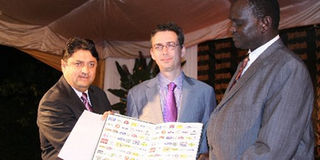Kenya’s poor show in global image ranking

Information and Communications Minister Hon. Samuel Poghisio (right) Steve Dodgson, Superbrands Chief Operating Officer (centre) and Jawad Jaffer, Superbrands East Africa Project Director, display ‘Superbrands East Africa Volume One’ which was launched recently. Photo/CHRIS OJOW
Kenya’s image globally is yet to recover from the effects of the recent post-election violence, grand corruption and threats of terrorism, a new survey shows.
The study released in London last week ranked Kenya at position 176 out of 200 countries surveyed based on stories published in the international press.
Apparently, most of the stories about the country were negative, mainly as a result of the post-election violence and corruption.
East West Communications, which conducted the survey, confirmed to the Saturday Nation that Kenya’s poor ranking was informed by corruption stories, political instability and the post-election violence that was highlighted in the media.
This is despite the country’s good performance in the Beijing Olympics in China where it emerged top in Africa and 15th globally.
The survey ranked Singapore as the top country in the world in terms of favourable mentions in the media.
It was followed by Hong Kong, with Malaysia, Taiwan, Australia, United Arab Emirates, Qatar, Monaco, Canada and the United Kingdom completing the top 10.
The ranking is a reflection of the international communities’ view of Kenya and influences almost every aspect of the country’s political and economic sphere.
This includes negative impacts on the country’s tourism sector, affecting government revenue and traders who live off the industry.
Highest ranked
Ghana is the highest ranked country in Africa at position 30, while the US is ranked 34th.
Asked what benefits a country derives from a high ranking, the president of East West Communications, Mr Thomas Cromwell, said that a high ranking translates to a favourable treatment in the global arena.
“The better a country’s overall image and rank, the more likely its sectors, ranging from investment to industry and tourism, will do well,” he said.
And while there might be quarterly spikes based on events or policies that may have positive or negative impacts on the international perception of a country, Mr Cromwell said, over time the ranking will reflect how a country stands up against others in the world system.
According to him, this guides potential investors and trading partners in making decisions. Perceived stability, pro-business policies and the rule of law, all of which are reflected in a country’s ranking, have a positive influence.
This comes hardly a month after Kenya witnessed a successful launch of the first East African Super-brands, which East African Community permanent secretary David Nalo described as a true reflection of the rising importance of branding in the vibrant and fast-growing economy.
Mr Jawad Jaffer, the project director of Super-brands, said that a book they had published pays tribute to brands they consider exceptional.
Speaking during the launch, Super-brands Group chief operating officer Steve Dodgson said a total of 64 companies’ brands in East Africa had been featured in the book.
Mr Jaffer equates this kind of branding products to the one of countries that East West Communications is doing.
“Like in products, a nation’s good branding is key to market dominance, longevity, goodwill, customer loyalty and overall market acceptance,” he said.
Governments are now expected to use this information to improve their policies. It is the first nation branding index to include all the countries and territories of the world.
It is based on approximately 400,000 news articles found in 38 prominent global media sources between April 1 and June 30, this year.
East West Communications hopes to come up with a more comprehensive ranking upon the collection of the full year’s results.




